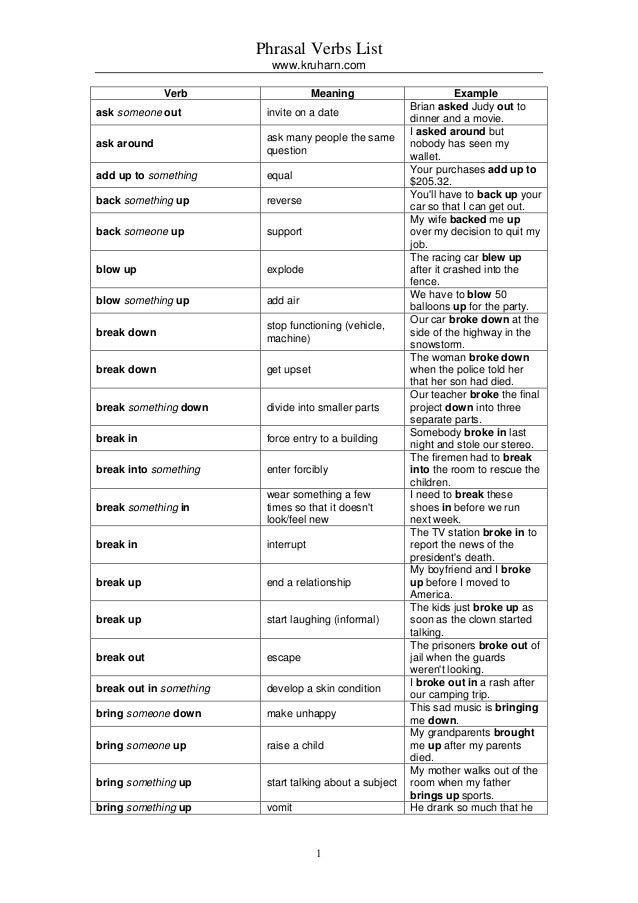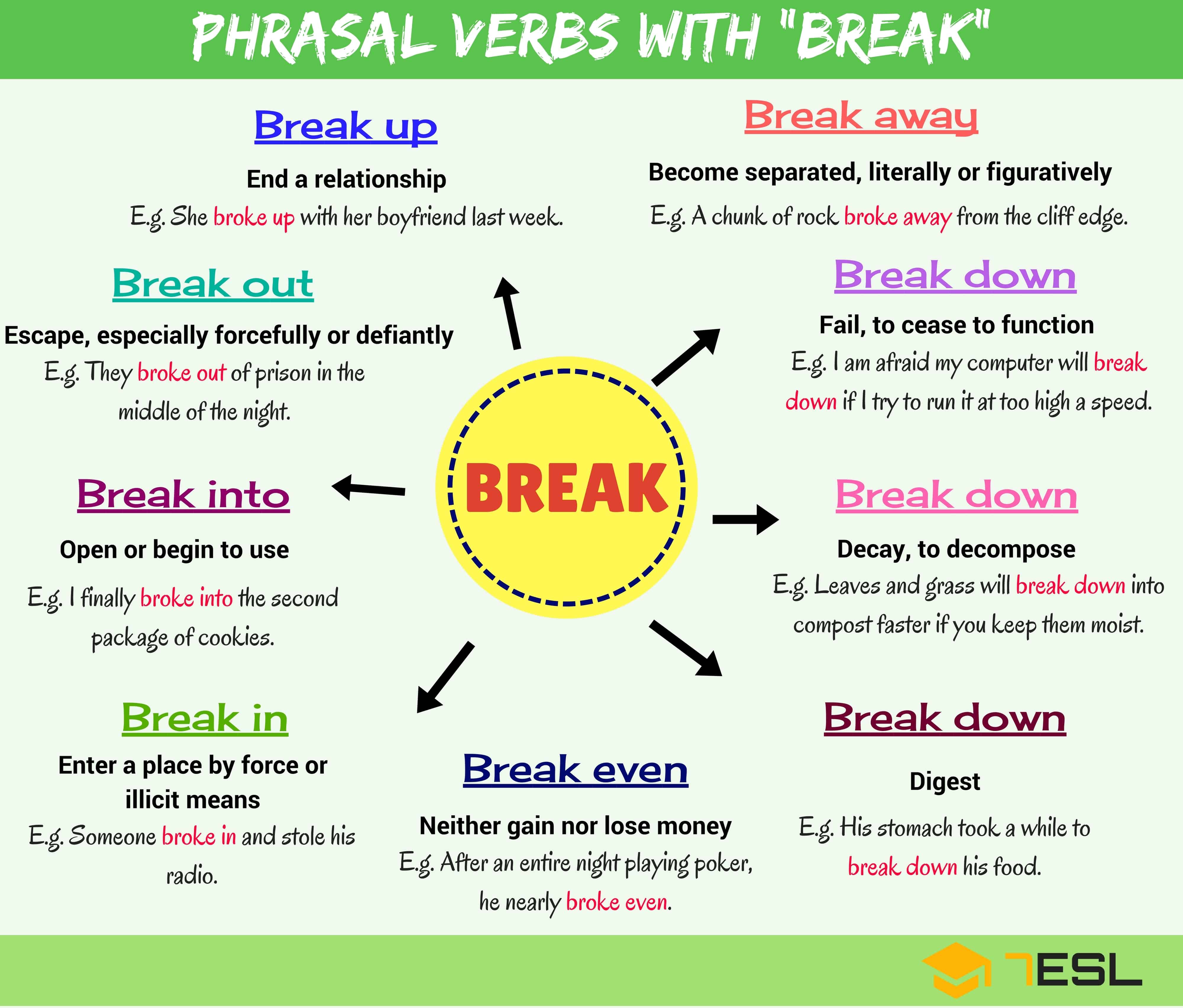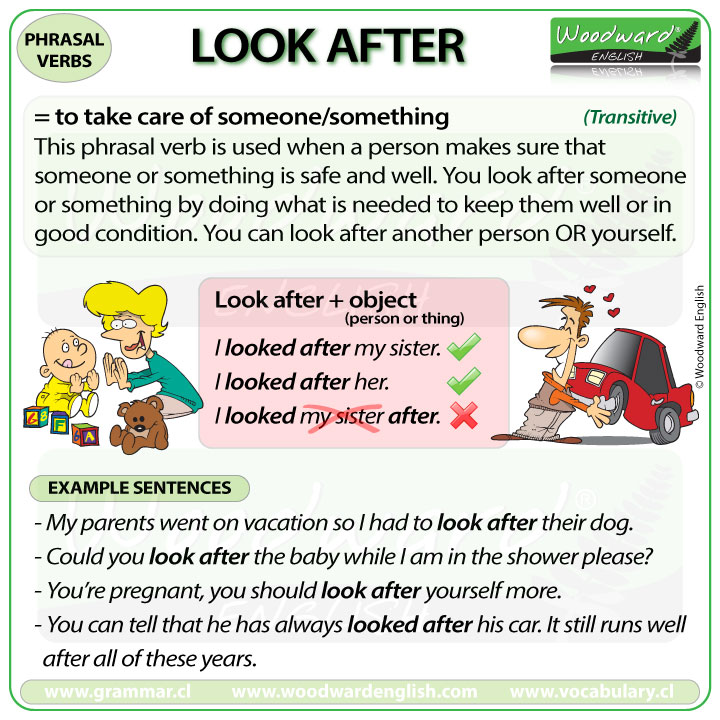Phrasal Verbs And Meanings
Phrasal verbs are an important part of learning the English language. Most phrasal verbs consist of two words (verb + adverb or verb + preposition) but a few consists of three words. Think of them as you would any other English vocabulary. Many phrasal verbs have more than one meaning, so you must be careful when you see a phrasal verb you think you know, or look up the meaning in a dictionary. In the examples marked *, the phrasal verb is much more natural than the explanation in brackets. Phrasal verbs are used just like verbs—anywhere they make sense! Usually, the verb and preposition in a phrasal verb need to be said together, like in the phrase “fall down.” In some cases, though, you can separate the verb and the preposition by putting other words in between them.
Aside from these functionalities making designing simpler, they also significantly accelerate design engineering processes. Eplan p8 2 6 crack. Managing Projects and Project Data Using the Quick Input Filter for project management makes it even easier to process and manage projects and project data. Subprojects are freely definable and can be saved at will, and there is more flexibility in name allocation.
Alphabetical lists of commonly-used phrasal verbs in English.
Alphabetical List - A
Phrasal Verbs And Meanings

- abide by
- Respect or obey (the law, a decision, a rule..).
'If you want to stay at this school, you must abide by the rules.'
- Respect or obey (the law, a decision, a rule..).
- account for
- Give a reason or an explanation.
'I hope you can account for all the money you spent!'
- Give a reason or an explanation.
- ache for
- Want someone or something very much.
'He was so lonely he ached for the sound of a human voice.'
- Want someone or something very much.
- act on
- Take action as a result of something.
'The police decided to act on the anonymous call they received.'
- Take action as a result of something.
- act out
- Demonstrate something with gestures and actions.
'The children acted out the scene in the classroom.'
- Demonstrate something with gestures and actions.
- act up
- Cause pain or annoyance by functioning badly.
Dad's poor knee is acting up again.'
- Cause pain or annoyance by functioning badly.
- add up
- Make sense; seem reasonable.
'She explained what happened but the details she gave just don't add up.'
- Make sense; seem reasonable.
- adhere to
- Support; follow; act in accordance with.
'All contestants must adhere to the rules.'
- Support; follow; act in accordance with.
- advise against
- Recommend not to do something.
The doctor advised him against carrying heavy loads.
- Recommend not to do something.
- agree with
- Have the same opinion as some else.
'I agree with you. I think she deserves the award too.'
- Have the same opinion as some else.
- aim at
- Direct towards a target.
'The policeman aimed his gun at the hijacker.'
- Direct towards a target.
- allow for
- Take into consideration; include in a calculation.
'It will take longer. You have to allow for heavy traffic at rush hour.'
'We must allow for food expenses too. Let's add 20€ per person.'
- Take into consideration; include in a calculation.
- allude to
- Mention or make reference to something in an indirect way.
'I don't understand. What problem is she alluding to?'
- Mention or make reference to something in an indirect way.
- amount to
- Reach; be equivalent to.
'The total repair work will amount to 1200€.
'His statement amounted to a confession.'
- Reach; be equivalent to.
- angle for
- Try to obtain somethiing by hinting or suggesting.
'From the way he's speaking I suspect Tom is angling for a free ticket.'
- Try to obtain somethiing by hinting or suggesting.
- answer back
- Reply rudely to someone in authority when you are expected to remain silent.
'I'm your teacher. Don't answer back !'
- Reply rudely to someone in authority when you are expected to remain silent.
- answer for
- Be held responsible for something.
'Normally parents have to answer for their children's behaviour.' - Speak on behalf of someone.
'I agree to your proposal, but I can't answer for my associate.'
- Be held responsible for something.
- answer to
- Be responsible to/be controlled by (someone)
'Who do you answer to in your job?'
- Be responsible to/be controlled by (someone)
- appeal to
- Plead or make an earnest request.
'The organisers appealed to the crowd to stay calm.' - Be attractive or interesting.
'The idea of camping in the woods doesn't appeal to me at all.'
- Plead or make an earnest request.
- apply for
- Make a formal request for something (job, permit, loan, etc.)
'When he saw the advertisement he decided to apply for the job.'
- Make a formal request for something (job, permit, loan, etc.)
- arrive at
- Reach (an agreement, a decision, a conclusion)
'It is hoped that they will arrive at an agreement at the end of the meeting.'
- Reach (an agreement, a decision, a conclusion)
- ask after
- Enquire about someone's well-being.
'My mother is always asking after you.'
- Enquire about someone's well-being.
- ask around
- Mention it to people you see or meet.
'I'll ask around and see if anyone has seen your cat.'
- Mention it to people you see or meet.
- ask in
- Invite someone to come inside.
'I couldn't leave her standing outside in the cold so I asked her in.'
- Invite someone to come inside.
- ask out
- Invite someone to lunch, dinner, the cinema ..
'John has asked Mary out several times.'
- Invite someone to lunch, dinner, the cinema ..
- attest to
- Prove to be true; bear witness to
'The number of visitors attest to the popularity of the website.'
- Prove to be true; bear witness to
- avail (oneself) of
- Take advantage of something (an opportunity)
'When the sales begin you should avail yourself of the opportunity and buy that coat.'
- Take advantage of something (an opportunity)
- average out at
- Result in an average(amount)
'The price of lunch averages out at 10€ per person.'
- Result in an average(amount)
More Phrasal Verbs:


Please note that British English spelling is used on this website.